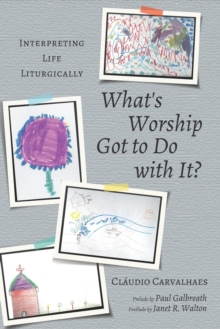This book connects the living realms of the church, the self, the neighbor and the world.
It envisions our daily local and global life from liturgical spaces, places where Christians worship God.
Through these relations, we can connect worship with economy, preaching with raising a village, baptism with forms of citizenship, ecology and the market, Easter with immigration, liturgical knees with colonization, spirituality with minority voices, all uttering prayers that name racism, poverty and a liberation theology of glory.
In these pages Claudio Carvalhaes issues a call to the churches to move from captive and colonized spaces into where the Spirit lives: among the poor, the needy, the forgotten.
With a variety of relations between the Christian faith and our cultural ways of living, Carvalhaes offers new liturgical and theological imaginings to be engaged with the most vulnerable in our societies and the earth.
A creative liturgical theology of liberation that makes sense of God between the world and the table/altar, between the pulpit and local communities, the worship space and our multiple lived experiences.
For liturgy is an endless song of liberation. This book is a call to life!""This book is a rare gift, a liturgical encounter, that celebrates God's presence among the poor and marginalized of this world.
I strongly recommend it."" --James H. Cone, Professor, Union Theological Seminary""As a historian, some writers about Christian liturgy have always alienated me with a-historical behavioral dogmatism--a Platonism of 'the proper.' My brother Claudio Carvalhaes refreshingly starts elsewhere, with an Aristotelian 'life comes first.' These richly contextualized essays liberate liturgy and show how liturgy can liberate.""--Jon Pahl, Professor, United Lutheran Seminary""Liturgy is, as Carvalhaes has lived, led and taught it across the Americas, a street theatre of resistance.
By critically interfacing the circulatory powers of the local (social, economic, ecological) with traditional memories, the divine economy becomes performatively enfleshed in the local.
Every worshipper in this way assumes the work of an organic intellectual!""--Sharon Betcher, Senior Fellow, Whidbey Institute, Whidbey Island, Washington""Carvalhaes refreshing collection of essays liberates us from centuries of distorted liturgy.
Wise and indispensable insight is given on centering and empowering a people to focus--via a contextualized worship--on what is important: their fellow congregants.
The reader is challenged to embrace our diversity, the means of finding God's liberative presence at the margins of society.""--Miguel A.
De La Torre, Professor, Iliff School of Theology""Christian worship is often imagined and practiced as two-dimensional: the individual and/or the congregation in relation to God.
For Carvalhaes there is a third dimension: the neighbor in need.
Authentic worship, he argues, is service to, with, and for the poor.
If this is a challenge, it is also a promise of liberation and vitality.""--Tom F.
Driver, The Paul J. Tillich Professor of Theology and Culture Emeritus, Union Theological SeminaryClaudio Carvalhaes is Associate Professor of Worship at Union Theology Seminary in New York City.
He is the author of Eucharist and Globalization. Redrawing the Borders of EucharisticHospitality (2013), editor of Liturgy in Postcolonial Perspectives: Only One Is Holy (2015), and editor of several issues of the journal CrossCurrents.

